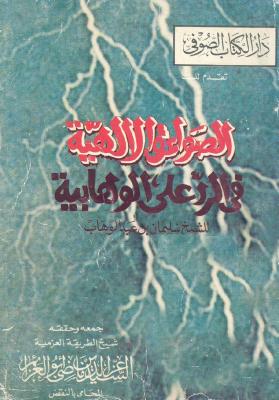5- And another presumption, because Sheikh Suleiman bin Abdul Wahhab disagreed with his brother was at the beginning of Sheikh Muhammad’s command, and at that time the responses did not go beyond the word of mouth at the beginning of Sheikh Muhammad’s command, and Muhammad Ibn Ghannam - may God have mercy on him - monitored this in his history and he contemplated them together, and he died soon after them. He mentions something from that, although he mentioned the opponents of Sheikh Muhammad in his call, and he did not mention the sheikhs Ahmed bin Muhammad al-Tuwaijri, and Ahmad and Muhammad, the sons of Othman bin Shabana, and they were among them and Sheikh Suleiman correspondence about the invitation and they were stopped at the beginning until they knew its sincerity and supported it as it can be seen From their exchanged letters, and we will supply some of them within the limits of what is suitable for him.
6- On the other hand, the word Wahhabism in its correct linguistic position is attributed to their father Abd al-Wahhab together, and Sulayman cannot have the innovation in giving this name to his brother’s call because he knows the significance of the Arabic language, just as he did not know that their father Abd al-Wahhab took this percentage, and from On the one hand, he did not respond to his father, and he realizes that the ratio is wrong because it is from the proportion of something to other than its origin, so we cannot say to Makki that he is civilian, nor to the Moroccan that he is Indian. He does not deceive Sheikh Suleiman bin Abdul-Wahhab, if he was the author of the response really, but if the response was tucked into him - and this is more likely to me - then the ignorance of the fabricator makes him fall into more informative slips than that.
And we said in the third context: Evidence that everyone who wrote was for a reason to be pushed to him, and the purpose of his intention is or directed to him to achieve a purpose around this invitation, as they see one of the most important things that must be highlighted by the opposition of the Sheikh of the people of Najd when they were caught in Iraq, in the Levant, in Egypt and elsewhere The sayings of people who Nuaa the call, as it appears from the responses of Ibn Zarzis and others ,,
Rather, the example of this is a mirdid al-Murad who went to Yemen in the year 1170 AH and then returned to Makkah and placed a muhaddah in the Haram, and Sheikh Abdullah bin Bassam said about him: “The intention is that this man and his ilk who opposed the reformist call are the ones who distorted its reputation and affixed lies to it and forged false propaganda on it, until Deceived by those who do not know their truth and do not inform their solution,
It was thrown by the hostility, from one arc, either from the envious, or from the deceived, deceived, or from the enemies of reform and religion until the Ottoman armies invaded its backyard, and it stopped its course and paralyzed its activity by eliminating its proponents and the extermination of the rulers of the first Saudi government and the men of knowledge among the sons of the sheikh Muhammad and his descendants. ”[The scholars of Najd: 3/949]
Among them is Suleiman bin Muhammad bin Suhaim, who was mentioned in many of the Sheikh’s letters that he writes to the Egyptians in the Nile from the Sheikh and attacks his call. He left for Al-Ahsa and then Al-Zubair in Iraq, and he died there in 1181 AH, and there were his children.
Among them is Muhammad bin Abdullah bin Fayrouz al-Najdi, originally al-Ahsa’i, who was one of the scholars, and he was mentioned in the letters of the sheikh. Al-Othmani to eliminate and suppress the da'wah, and some of his students supported him in this approach except for Sheikh Muhammad bin Rashid Al-Afaliqi, who immigrated to Medina and knew the truth of the call, so he called for it as is the case of Sheikh Suleiman bin Abdul Wahhab and his three companions who were mentioned, and when Imam Saud bin Abdulaziz entered Madinah honored Sheikh Muhammad bin Rashid Al-Afaliqi, as was his custom in honoring scholars, and made him over the city’s district, and his efforts were evident in introducing people to this invitation, especially in Egypt after he inhabited it. In the year 1257 AH. [See famous Najd scholars by Abd al-Rahman Al-Sheikh, 228]
Among them is Abdullah bin Isa al-Musa, the judge of sanctity, who was mentioned in the Sheikh’s letters a lot, and the Sheikh warned people about him and his deeds, and he died in his country in 1175 AH before the spread of the da'wa and the expansion of its circle in the Arabian Peninsula. [The Scholars of Najd: 2/604]
Among them is Othman bin Mansour, who studied in Iraq and among his most famous sheikhs: Dawood bin Zarzis and Muhammad bin Salloum Al-Fardi, who are among the stiffest opponents of the call, and between Ibn Zarzis and scholars we find responses and disagreements about this call, and Ibn Bassam said about him in his translation: “The translator has hesitations in his direction. Al-Aqdi, so one time he follows the Salafi da'wa and belongs to it, and the other moves away from it and loyal to its enemies, and that is when Daoud bin Gerges, who decided that it is desirable to reach the righteous from the dead and seek their help, and so on, which contradicts the net belief, supported him and praised him and praised his method and read his book and praised his approach with a poem It reached thirty-six verses, and Najd scholars responded to it with similar poems with weight and rhyme more than seven. [Najd Scholars: 3/696]
Among them is Ibrahim bin Yusuf, who was educated and lived in Damascus and is from Ashqir, and he had a circle in the Umayyad Mosque and was killed in mysterious circumstances there in 1187 AH.
And many others whose names came in the responses of Sheikh Muhammad and his students, but we did not see a single response in which he referred to Sheikh Suleiman bin Abdul Wahhab's persistence in his hostility to the call, and there is no indication of a response from him to the sheikh, which indicates that the alleged response called in the name of ((the thunderbolts divine in Response to Wahhabism)) and the subsequent responses defamed Sheikh Suleiman in order to be stronger behind this on their intent with a peace they want the closest way to lead them to their goals, and in order to invoke Sheikh Suleiman in strengthening their suspicions and reinforcing their falsehood.


